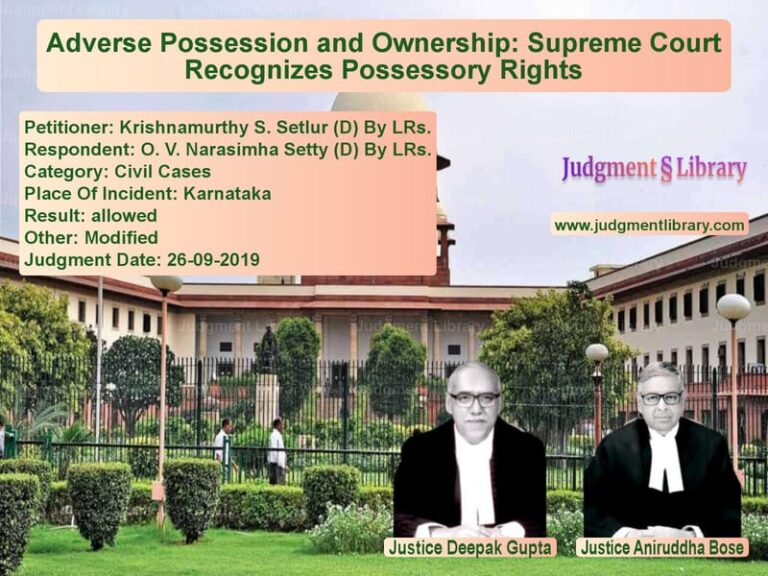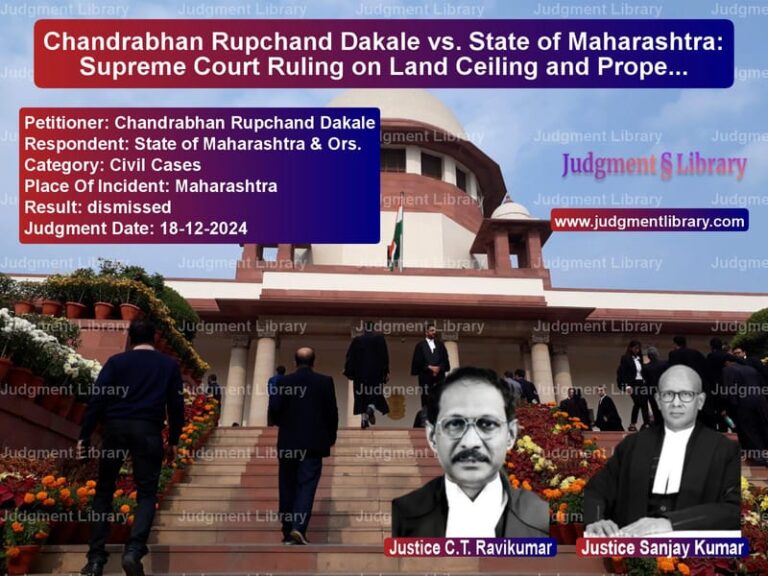Irretrievable Breakdown of Marriage: Supreme Court’s Verdict on Divorce and Article 142
The Supreme Court of India recently decided a significant case concerning the issue of whether the irretrievable breakdown of marriage should automatically result in the dissolution of the marriage under Article 142 of the Constitution of India, even when such a ground is not explicitly recognized under the Hindu Marriage Act, 1955. The case, Dr. Nirmal Singh Panesar v. Mrs. Paramjit Kaur Panesar, involved a dispute between a retired Air Force officer and his wife over the grant of divorce. The decision is pivotal in interpreting the scope of Article 142 in matrimonial disputes.
Background of the Case
The appellant, Dr. Nirmal Singh Panesar, a retired Air Force officer, and the respondent, Mrs. Paramjit Kaur Panesar, a retired school teacher, were married in 1963 as per Sikh rites. Their marriage lasted over two decades without dispute until 1984, when the husband was posted to Madras. The wife chose to stay back in Amritsar with her son, which led to marital discord.
In 1996, the husband filed for divorce before the District Court in Chandigarh on two grounds:
- Cruelty under Section 13(1)(ia) of the Hindu Marriage Act, 1955.
- Desertion under Section 13(1)(ib) of the Hindu Marriage Act, 1955.
The District Court granted the divorce, dissolving the marriage, but this decision was overturned by the High Court of Punjab and Haryana, both by a Single Judge and later by a Division Bench. The High Court ruled that the husband failed to prove cruelty or desertion. Aggrieved by the judgment, the husband approached the Supreme Court, seeking dissolution of marriage based on the claim that it had irretrievably broken down.
Arguments by the Appellant (Husband)
The appellant’s counsel, Mr. Vipin Gogia, made the following submissions:
- The High Court erred in reversing the District Court’s well-reasoned judgment that had found the wife guilty of cruelty and desertion.
- The respondent refused to accompany the appellant when he was transferred to Madras, which amounted to desertion.
- The respondent refused to take care of the appellant even when he had serious health issues.
- The respondent had filed complaints against the appellant to Air Force authorities with the intention of maligning his reputation, which amounted to mental cruelty.
- Even if the specific grounds of cruelty and desertion are not fully proven, the marriage had irretrievably broken down, justifying the grant of divorce under Article 142 of the Constitution.
- The couple had been living separately since 1996, making reconciliation impossible.
Arguments by the Respondent (Wife)
The respondent’s counsel, Ms. Madhurima Tatia, opposed the appeal and presented the following arguments:
- The wife had always upheld the sanctity of marriage and did not wish to bear the stigma of being a divorcee at this late stage in life.
- She had made all efforts to preserve the marriage and was still willing to take care of the appellant with the help of their son.
- Merely living apart for a long time does not mean that the marriage has irretrievably broken down.
- The husband failed to prove either cruelty or desertion, as required under the Hindu Marriage Act.
- The courts should not grant divorce just because one spouse wants it; the right to divorce must be based on valid legal grounds.
Legal Principles Considered by the Supreme Court
The Supreme Court examined the concept of “cruelty” and “desertion” in divorce cases. It referred to its earlier judgments, including:
- Naveen Kohli v. Neelu Kohli (2006) 4 SCC 558 – Defined cruelty as conduct that adversely affects the mental or physical health of the spouse.
- Shobha Rani v. Madhukar Reddi (1988) 1 SCC 105 – Held that cruelty can be mental or physical, intentional or unintentional.
- Lachman Utamchand Kirpalani v. Meena (1964) AIR SC 40 – Defined desertion as the intentional abandonment of one spouse by the other without consent and without reasonable cause.
- Shilpa Sailesh v. Varun Sreenivasan (2023 SCC Online SC 544) – Held that irretrievable breakdown of marriage could be a ground for divorce under Article 142 but must be exercised cautiously.
The Court reiterated that cruelty and desertion must be proven through substantial evidence. It noted that mere separation does not necessarily amount to desertion.
Supreme Court’s Verdict
The Supreme Court ruled against granting the divorce. It held that:
- The husband failed to prove cruelty or desertion.
- The wife’s decision to stay in Amritsar was not a willful abandonment but was based on family circumstances.
- The wife continued to fulfill her duties as a mother and was even willing to care for the husband.
- The marriage may be emotionally strained, but that alone is not a legal ground for divorce.
- While the Supreme Court has the power under Article 142 to grant divorce in cases of irretrievable breakdown of marriage, it must be exercised with caution.
- Given the wife’s willingness to maintain the marital bond, granting divorce would be unjust to her.
Conclusion
The Supreme Court dismissed the appeal and upheld the High Court’s decision. It reinforced that marriage is a sacred institution and that irretrievable breakdown alone is not a straitjacket ground for divorce. The judgment highlights the Court’s careful approach in balancing legal grounds for divorce with the social realities of marriage in India.
Petitioner Name: Dr. Nirmal Singh Panesar.Respondent Name: Mrs. Paramjit Kaur Panesar.Judgment By: Justice Aniruddha Bose, Justice Bela M. Trivedi.Place Of Incident: Chandigarh, India.Judgment Date: 10-10-2023.
Don’t miss out on the full details! Download the complete judgment in PDF format below and gain valuable insights instantly!
Download Judgment: dr.-nirmal-singh-pan-vs-mrs.-paramjit-kaur-p-supreme-court-of-india-judgment-dated-10-10-2023.pdf
Directly Download Judgment: Directly download this Judgment
See all petitions in Alimony and Maintenance
See all petitions in Mutual Consent Divorce
See all petitions in Property Division in Divorce Cases
See all petitions in Dowry Cases
See all petitions in Divorce by Desertion
See all petitions in Judgment by Aniruddha Bose
See all petitions in Judgment by Bela M. Trivedi
See all petitions in dismissed
See all petitions in supreme court of India judgments October 2023
See all petitions in 2023 judgments
See all posts in Divorce Cases Category
See all allowed petitions in Divorce Cases Category
See all Dismissed petitions in Divorce Cases Category
See all partially allowed petitions in Divorce Cases Category







